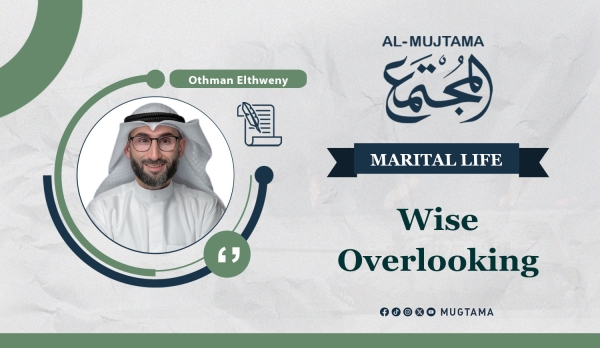When souls gather under one roof, emotions intertwine just as hands clasp together in sincere supplication at the family table. The family is a living, breathing entity, strengthened by the bonds of affection, yet not immune to stumbles or free from missteps. Herein lies the value of overlooking faults—an art so profound that it maintains the balance between firmness and gentleness, between reproach and forgiveness, and between correction and letting go.
Marriage is not a battlefield where faults are meticulously counted, nor is it a sensitive scale where words are weighed with rigid precision. Rather, it is a safe space where minor mistakes are allowed to pass unnoticed, and fleeting actions are buried in the memory of forgiveness. Imam Ahmad ibn Hanbal once said, “Nine-tenths of good character lies in overlooking faults.” Overlooking, in this sense, is not a sign of weakness but an acknowledgment that perfection is impossible and that excessive idealism suffocates love in its infancy. When spouses realize that forgiving each other’s slip-ups makes life easier, their relationship becomes warmer and more tranquil. If each of them clung to every mistake, life would turn into an endless struggle.
4 Steps to Prevent Marital Conflicts from Escalating
From a psychological perspective, the concept of “positive interpretation of events” suggests that happy individuals tend to attribute their partner’s actions to circumstances rather than ill intent. A wife who notices her husband engrossed in his phone does not immediately assume neglect but rather understands that he might be occupied with something important. The same applies in reverse.
Children are not molds ready to be shaped according to their parents’ whims; they are souls in the process of formation, in need of having their mistakes embraced rather than hunted down. There is a difference between constructive overlooking—where a minor misstep is ignored so it does not grow—and negligence, which allows bad behaviors to escalate into habits. A child who lies for the first time does not need a terrifying scream as much as a look of understanding that signals he has misbehaved but remains worthy of trust. According to Bandura’s theory of “positive reinforcement,” children learn more from their parents’ reactions than from direct advice. When a child sees that their parents do not exaggerate their mistakes but instead guide them gently, they develop a strong moral awareness.
Overlooking is not an escape from responsibility, nor does it mean remaining silent about repeated errors that turn into habits. Rather, it is a conscious choice about which battles are worth fighting. Some situations cannot be ignored—such as persistent negligence, failure to fulfill fundamental rights, or harmful behaviors. As Umar ibn al-Khattab said, “I am not deceitful, nor can a deceiver fool me,” meaning that wisdom lies in knowing when overlooking is a virtue and when it is mere heedlessness.
Eventually, a family is not an administrative institution built on surveillance and evaluation but rather a garden that must be watered with the nourishment of forgiveness. Overlooking faults is that pure water that keeps it flourishing. Those who master the art of overlooking with wisdom do not burden themselves with trivial matters, nor do they weigh their loved ones down with expectations beyond their capacity. Instead, they cultivate an atmosphere of tolerance and affection in their home, reaping a life of serenity enjoyed by all. Thus, overlooking becomes a refined art, not surrender; a responsible choice, not abandonment; and one of the secrets of happiness known only to those with generous hearts!
Make Your Homes a Sacred Sanctuary
-------------------------------------------------------------


